Arthur & George 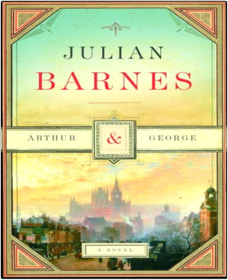 In the vast expanse of late-Victorian Britain, two boys come to life: George, the son of a Midlands vicar, and Arthur, in shabby genteel Edinburgh, both of them feeling at once near to and impossibly distant from the beating heart of Empire. One falls prey to a series of pranks en route to a legal vocation, while the other studies medicine before discovering a different calling entirely, and it is years before their destinies are entwined in a mesmerizing alliance. We follow each through outrageous accusation and unrivaled success, through faith and perseverance and dogged self-recrimination, whether in the dock awaiting complete disgrace or at the height of fame while desperately in love with a woman not his wife, and gradually realize that George is half-Indian and that Arthur becomes the creator of the world’s most famous detective. Ranging from London clubs to teeming prisons, from a lost century to the modern age, this novel is a panoramic revelation of things we thought we knew or else had no clue of, as well as a gripping exploration of what goals drive us toward whatever lies in wait–an experience resounding with issues, no less relevant today, of crime and spirituality; of identity and nationality; of what we think, what we believe and what we can prove. Intriguing, relentless and, most of all, moving, Arthur & George richly extends the reach and achievement of a novelist described by the Philadelphia Inquirer as “a dazzling mind in mercurial flight.” Before She Met Me 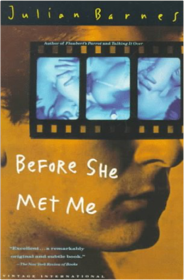 Changing My Mind 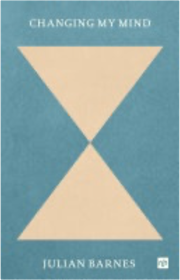 Cross Channel 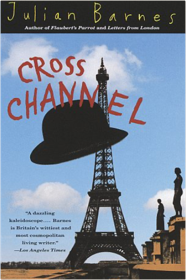 "Barnes is a witty, playful and ironic writer at the top of his form...Cross Channel is in the best sense an artful book."—San Francisco Chronicle "Fluently written, finely observed...delicately patterned."—New York Times Elizabeth Finch: A novel 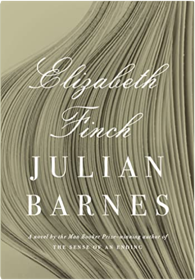 England, England 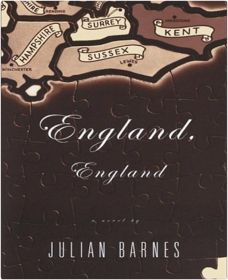 Flaubert's Parrot 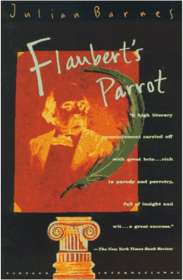 Flaubert's Parrot; A History of the World in 10 1/2 Chapters (Everyman's Library (Cloth)) 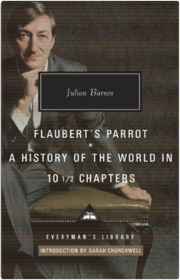 Flaubert's Parrot, Julian Barnes's breakthrough book—shortlisted for the Booker Prize in 1984—is the story of Geoffrey Braithwaite, a retired doctor who is obsessed with the French author and with tracking down a stuffed parrot that once inspired him. Barnes playfully combines a literary detective story with a character study of its detective, embedded in a brilliant riff on literary genius. A History of the World in 10 1/2 Chapters is a mix of fictional and historical narratives of voyage and discovery—ranging from a woodworm's perspective on Noah's ark to a survivor from the sinking of the Titanic—that question our ideas of history. One of his most inventive works, it was praised by Salman Rushdie as "frequently brilliant, funny, thoughtful, iconoclastic, and a delight to read." A History of the World in 10 1/2 Chapters 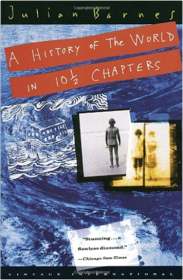 Keeping an Eye Open: Essays on Art 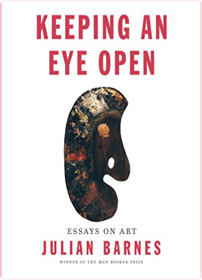 As Julian Barnes notes: “Flaubert believed that it was impossible to explain one art form in terms of another, and that great paintings required no words of explanation. Braque thought the ideal state would be reached when we said nothing at all in front of a painting . . . But it is a rare picture that stuns, or argues, us into silence. And if one does, it is only a short time before we want to explain and understand the very silence into which we have been plunged.” This is the exact dynamic that informs his new book. In his 1989 novel A History of the World in 10½ Chapters, Barnes had a chapter on Géricault’s The Raft of the Medusa, and since then he has written about many great masters of nineteenth- and twentieth-century art, including Delacroix, Manet, Fantin-Latour, Cézanne, Degas, Redon, Bonnard, Vuillard, Vallotton, Braque, Magritte, Oldenburg, Lucian Freud and Howard Hodgkin. The seventeen essays gathered here help trace the arc from Romanticism to Realism and into Modernism; they are adroit, insightful and, above all, a true pleasure to read. Letters from London 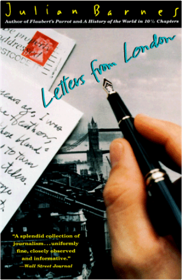 Levels of Life 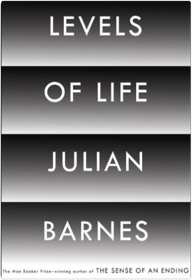 Levels of Life is a book about ballooning, photography, love and loss; about putting two things, and two people, together, and about tearing them apart. One of the judges who awarded Barnes the 2011 Booker Prize described him as “an unparalleled magus of the heart.” This book confirms that opinion. “Spare and beautiful...a book of rare intimacy and honesty about love and grief. To read it is a privilege. To have written it is astonishing.” —Ruth Scurr, The Times of London “A remarkable narrative that is as raw in its emotion as it is characteristically elegant in its execution.” —Eileen Battersby, The Irish Times Love, etc. 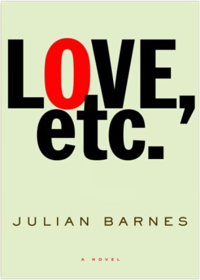 From such questions, and using all the surprising, sophisticated ingredients of a delightful farce, Julian Barnes has created a tragicomedy of human frailties and needs. Love, etc. stars three characters introduced a decade ago in Talking It Over—to which this novel has an eerie, freestanding relation. Which is precisely how Stuart feels toward Gillian, his wife before his witty, feckless, former best friend Oliver stole her away. True, he did make a fuss at their subsequent wedding, and spied on them in their French village; but he was agreeable about the divorce, moved to America, remarried briefly, prospered, then returned to London shortly after Oliver and Gillian, avec les enfants, did. Meanwhile, Oliver’s artistic ambitions have turned to ashes in his mouth, so it’s Gillian supporting the household—until Stuart rejoins them. What transpires to further complicate the situation doesn’t bear repeating, especially as the three principals (along with many others) are allowed to speak directly to the reader, to whisper their secrets and argue their own particular versions of what actually happened, and why. Indeed, emerging from this crux are a number of truths we all live by: faith and generosity, trust and commitment, toward ourselves and our loved ones; or, absent those, banality and even brutality. Every bit as funny and intelligent as anything Julian Barnes has written, Love, etc. is also fabulously engaging, powerfully dramatic, and profoundly unsettling. The Man in the Red Coat  Metroland 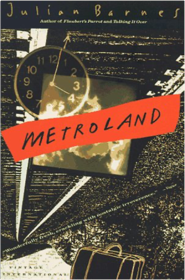 The Noise of Time 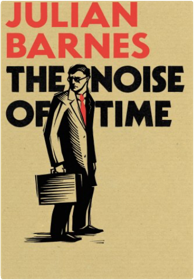 Nothing to Be Frightened Of 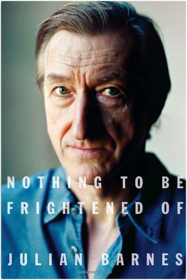 If the fear of death is “the most rational thing in the world,” how does one contend with it? An atheist at twenty, an agnostic at sixty, Barnes looks into the various arguments for and against and with God, and at the bloodline whose archivist, following his parents’ death, he has become—another realm of mystery, wherein a drawer of mementos and his own memories (not to mention those of his philosopher brother) often fail to connect. There are other ancestors, too: the writers—“most of them dead, and quite a few of them French”—who are his daily companions, supplemented by composers and theologians and scientists whose similar explorations are woven into this account with an exhilarating breadth of intellect and felicity of spirit. Deadly serious, masterfully playful, and surprisingly hilarious, Nothing to Be Frightened Of is a riveting display of how this supremely gifted writer goes about his business and a highly personal tour of the human condition and what might follow the final diagnosis. The Pedant in the Kitchen 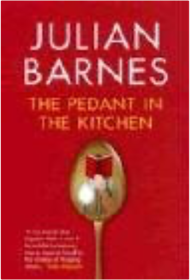 The Porcupine 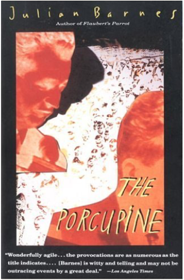 Pulse: Stories 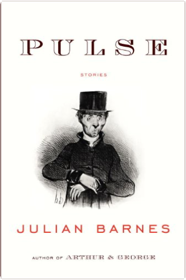 From an imperial capital in the eighteenth century to Garibaldi’s adventures in the nineteenth, from the vineyards of Italy to the English seaside in our time, he finds the “stages, transitions, arguments” that define us. A newly divorced real estate agent can’t resist invading his reticent girlfriend’s privacy, but the information he finds reveals only his callously shallow curiosity. A couple come together through an illicit cigarette and a song shared over the din of a Chinese restaurant. A widower revisiting the Scottish island he’d treasured with his wife learns how difficult it is to purge oneself of grief. And throughout, friends gather regularly at dinner parties and perfect the art of cerebral, sometimes bawdy banter about the world passing before them. Whether domestic or extraordinary, each story pulses with the resonance, spark, and poignant humor for which Barnes is justly heralded. The Sense of an Ending 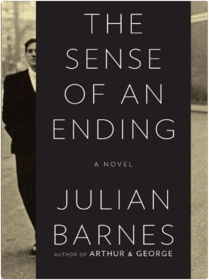 This intense new novel follows a middle-aged man as he contends with a past he has never much thought about—until his closest childhood friends return with a vengeance, one of them from the grave, another maddeningly present. Tony Webster thought he’d left all this behind as he built a life for himself, and by now his marriage and family and career have fallen into an amicable divorce and retirement. But he is then presented with a mysterious legacy that obliges him to reconsider a variety of things he thought he’d understood all along, and to revise his estimation of his own nature and place in the world. A novel so compelling that it begs to be read in a single sitting, with stunning psychological and emotional depth and sophistication, The Sense of an Ending is a brilliant new chapter in Julian Barnes’s oeuvre. Something to Declare: Essays on France and French Culture 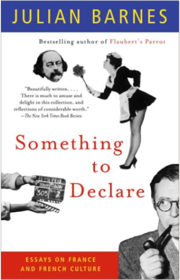 Staring at the Sun 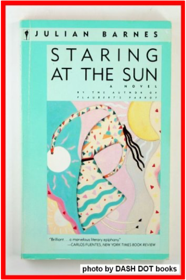 Talking It Over 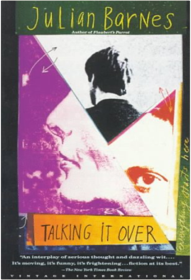 Through the Window: Seventeen Essays and a Short Story 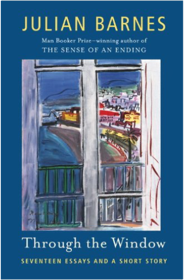 In these seventeen essays (plus a short story and a special preface, “A Life with Books”), Julian Barnes examines the British, French and American writers who have shaped his writing, as well as the cross-currents and overlappings of their different cultures. From the deceptiveness of Penelope Fitzgerald to the directness of Hemingway, from Kipling’s view of France to the French view of Kipling, from the many translations of Madame Bovary to the fabulations of Ford Madox Ford, from the National Treasure status of George Orwell to the despair of Michel Houellebecq, Julian Barnes considers what fiction is, and what it can do. As he writes, “Novels tell us the most truth about life: what it is, how we live it, what it might be for, how we enjoy and value it, and how we lose it.” The Lemon Table : Stories 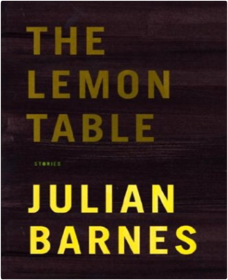 “Life is just a premature reaction to death,” was what Viv’s husband used to say. Once her lover and friend, he is now Viv’s semi-helpless charge, who is daily sinking ever deeper into dementia. In “Appetite,” Viv has found a way to reach her husband: by reading aloud snippets of recipe books until he calls out indelible — and sometimes unfortunate — scenes locked away in his brain. In “The Things You Know,” two elderly friends enjoy their monthly breakfast meetings that neither would ever think of missing. Of course, all they really have in common is a fondness for flat suede shoes and a propensity for thinking spiteful, unspoken thoughts about one another’s dead husbands. “The Fruit Cage” is narrated by a middle-aged man whose seemingly orderly upbringing is harrowingly undone when he discovers that his parents’ old age is not necessarily a time of serenity but actually an age of aroused, perhaps violent, passions. In these stories, Julian Barnes displays the erudition, wit and uncanny insight into the human mind that mark him as one of today’s great writers, one whose intellect and humour never obscure a genuine affection for his characters. Duffy Omnibus 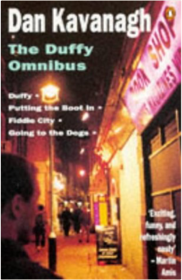 |


Delicious Library
Collection Total:
3,640 Items
3,640 Items
Last Updated:
Nov 2, 2025
Nov 2, 2025


 Made with Delicious Library
Made with Delicious Library